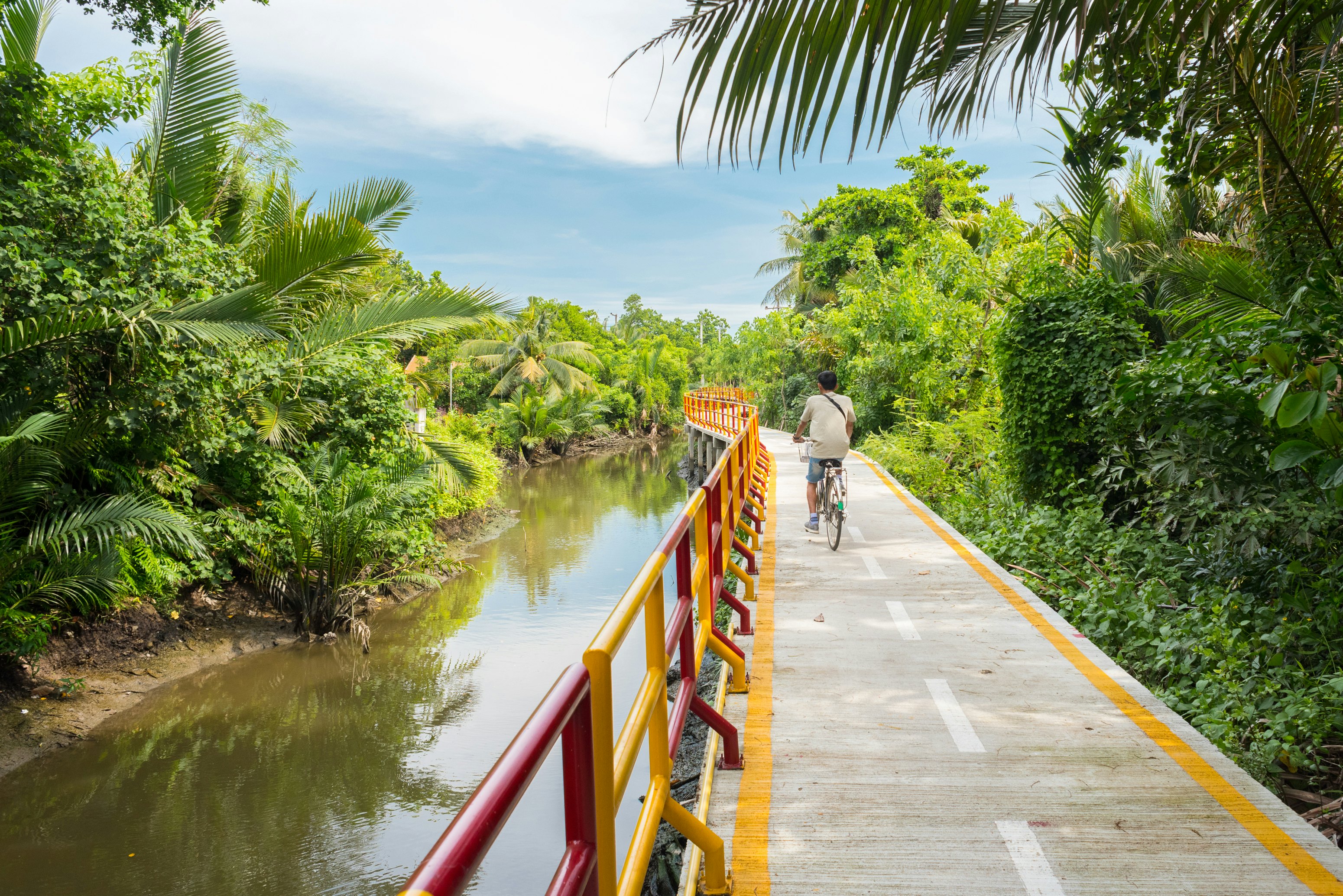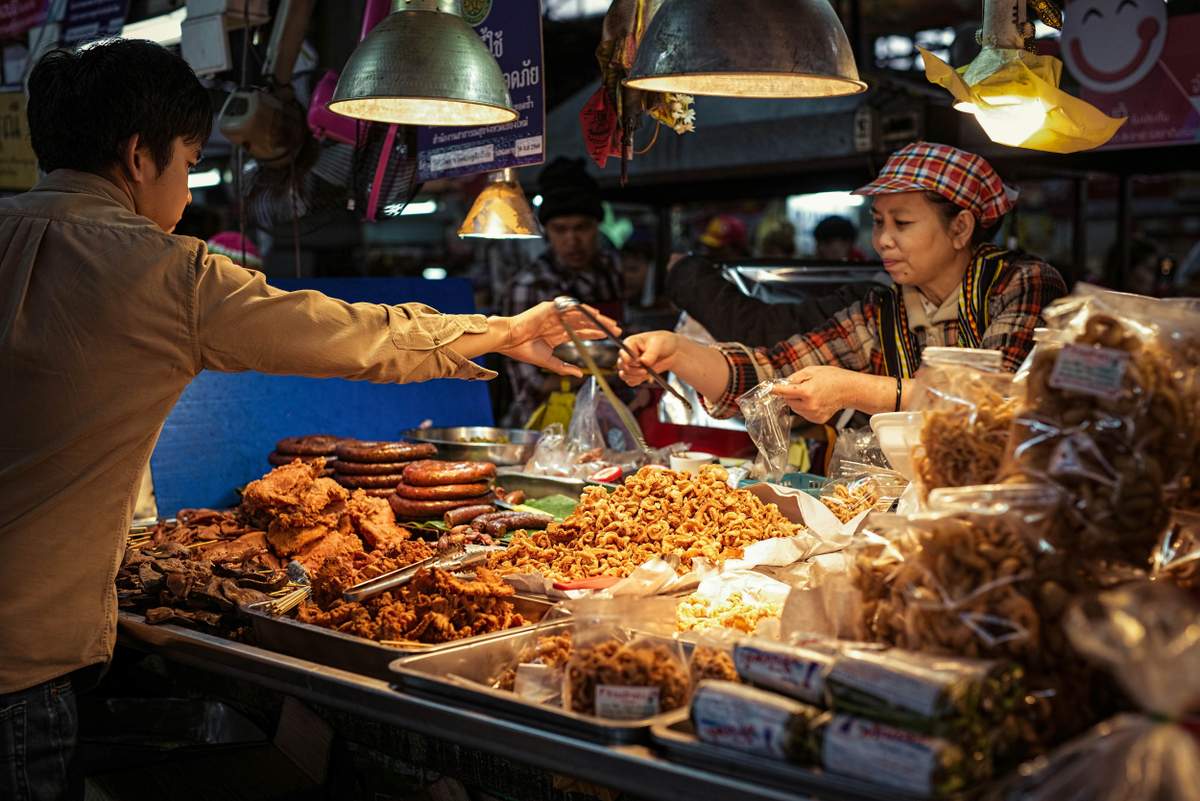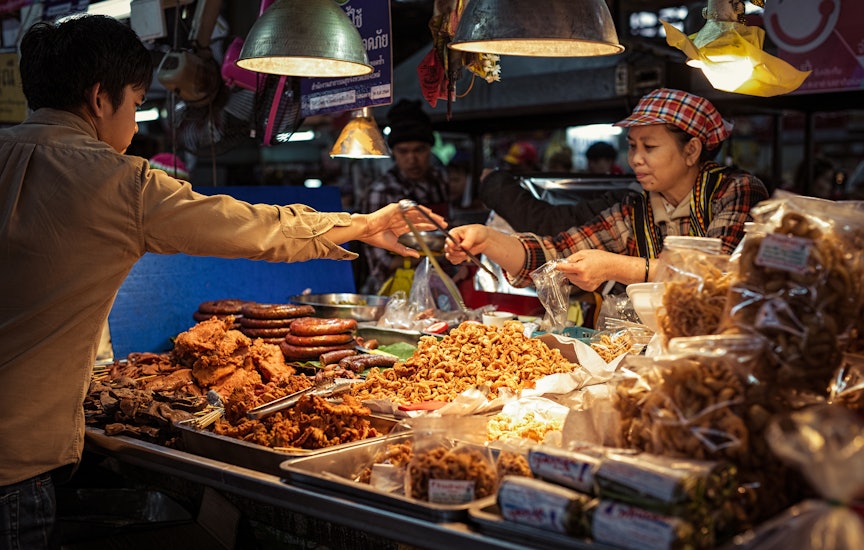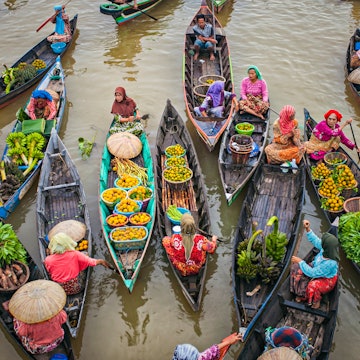

Phu Kradueng National Park. mr_gateway/Shutterstock
With compelling sights like misty peaks, hidden ancient temples, otherworldly karst outcrops and dense national parks teeming with wildlife, Thailand serves hikers a veritable feast of amazing trails.
After you’ve laced up your boots (or fastened your sandals), you can conquer mountains, circumnavigate stunning sandy islands and make your way to Thailand’s biggest waterfall. What’s more, it’s easy to get around Thailand and reach most hiking trails independently, thanks to the superb transportation system, though there are plenty of excellent trekking guides available for tours.
So pack a few hiking specifics (heavy-duty insect repellent, sunscreen, leech socks) because we’re about to set off on the best hikes in Thailand.
1. Phu Kradueng National Park
Best hike to a peak
Distance: 9.5km
Estimated time to complete: 4–6 hours
Level of difficulty: moderate to hard
Phu Kradueng is the main peak in the namesake national park in Loei Province in northeast Isan. The climb isn’t that taxing to begin with, but it gets tougher as hikers approach the plateaulike summit. While locals typically complete the climb in a day, a campsite at the top provides a place to spend the night and see a stunning sunset over Mak Dook cliff; sunrise over the Nok Aen cliff is equally extraordinary. You can also rent bicycles to explore the area at your own pace.
Planning tip: The descent is hard on the knees; borrow one of the walking sticks on offer.

2. Kew Mae Pan Nature Trail
Best hike near Chiang Mai
Distance: 2.7km
Estimated time to complete: 2–3 hours
Level of difficulty: easy
Hikers on the Kew Mae Pan Nature Trail can see one of the most beautiful panoramic views in all of Thailand. Within the Doi Inthanon National Park near Chiang Mai, the 2200m Kew Mae Pan mountain stands only a few hundred meters south of Doi Inthanon, Thailand’s highest peak, at 2565m.
The short circular trail, with boardwalks, begins inside a forest of mossy trees and ferns that bursts with red rhododendrons between January and March. After passing the Mae Pan waterfall, the thicket opens to a bright green grassland, and the path continues to the Kew Mae Pan viewpoint (also called Station 9), which dominates the reserve and is known for its breathtaking sunrise views.
Planning tip: Guides are compulsory, so be prepared to pay 220 Thai baht (฿) in addition to the park's 300฿ entry fee.

3. Um Phang
Best multiday hike
Distance: varies by trail
Estimated time to complete: varies by trail
Level of difficulty: moderate to hard
A fraction of the visitors to the popular Chiang Mai Province or the Mae Hong Son loop come to Um Phang and Tak, which both offer equally spectacular hiking. All treks start in and around the Um Phang Wildlife Sanctuary and use the Mae Klong as a waterway for deeper jungle exploration.
The region is well suited to multiday hikes. Travelers could spend a week trawling its hills, bunking down at Karen villages and hiking south along the border with Myanmar to the Three Pagodas Pass (Phra Jedii Sǎam Ong) at Sangkhlaburi, an area that served as the main supply line for the construction of the Japanese Thailand–Burma railway in WWII.
Yet most come here to see Thailand’s largest waterfall, Thilawsu. From the wildlife sanctuary, it’s a 2-hour hike to the striking cascade through dense palms, giant bamboo and strangler figs – an exertion that’s rewarded by a dip in the waterfall’s pools.
Planning tip: Advanced hikers can attempt the 20km slog to Mt Kagerla, the fourth-highest peak in Thailand. However, at 1428m, it’s not for the faint of heart (or muscle).

4. Phanom Rung
Best hike within an archeological site
Distance: 1km
Estimated time to complete: half a day
Level of difficulty: easy
While it is not quite the same setting as a traditional hike, few places are more inspiring than the Phanom Rung complex near Buriram. Standing on the rim of a dormant volcano, some 200m above the rice fields of Isan in the northeast, this 10th-century Khmer temple is built from pink sandstone. Complementing the striking archaeological site itself, the climb to Phanom Rung follows an ancient walkway flanked with the heads of naga (serpent guardians).
Planning tip: From the parking area, the trail morphs into a stairway to the plateau, where the main temple and its 15 doorways await.
5. Koh Jum
Best island hike
Distance: 6km
Estimated time to complete: 4–6 hours
Level of difficulty: easy to moderate
Motorcycles are the only vehicles allowed on the low-key island of Ko Jum (Ko Pu), just off of Krabi. Fortunately, the most rewarding way to explore this paradisiacal atoll is on foot. The western coast has a flat trail that flits between coves and quiet beaches for 6km, but for views as far as Ko Phi-Phi (on clear days), tackle the steep climb up Khao Koh Pu. Two trailheads lead to the 400m-high summit. The most direct route starts at the 2.9km sign on the circular road surrounding the hill.
Planning tip: Navigating the empty rubber estates can be tricky, but locals will take guests up for about 1000฿.

6. Wat Tham Suea
Best hike to a temple
Distance: 1km
Estimated time to complete: half a day
Level of difficulty: moderate
It’s a short, steep climb up to the 278m-high limestone outcrop that overlooks Krabi Town, and hikers who successfully tackle the 1260 stairs to the summit are rewarded with access to Wat Tham Suea (Tiger Cave Temple), plus stellar views. The temple is named for the tigers that locals once believed dwelled in the surrounding caves; while you won’t find any prowling cats today, you will encounter golden stupas and a large seated Buddha silently keeping watch over the emerald forest and sprawling blue sea below.
Carry plenty of water for the rigorous ascent and humid air. A hiking pole can be useful, too, both to haul yourself up and to keep the resident monkeys at a distance.
Planning tip: Since this is an active temple, remember to wear culturally appropriate clothing such as trousers or long skirts and tops that cover your shoulders.

7. Khao Sok National Park
Best jungle trek
Distance: 12km
Estimated time to complete: 2–3 hours
Level of difficulty: moderate
Skirting the southern side of Cheow Lan lake, the dense forest and towering limestone karsts of Khao Sok make this jungle trek one of the best in southern Thailand. And with 48 mammal species roaming the forests, there are plenty of excellent wildlife spotting opportunities. Expect gibbons, macaques and barking deer for the most part; elusive species such as sun bears, clouded leopards and tigers have been known to make appearances as well.
Several trails, each around 12km long, start from Khao Sok village, on the southern edge of the park, before cutting through dense forest and winding past tumbling waterfalls until reaching the southern shore of the lake. Posthike, Cheow Lan’s floating homestays, surrounded by fanglike karsts that rise from the water, are a popular spot for taking in the lake and the northern side of the reserve.
Planning tip: In October and December, the world’s largest (and smelliest) parasitic flower, the Rafflesia kerrii, blooms in the jungle, which can be quite a sight (and scent).

8. Khao Yai National Park
Best hike in a national park
Distance: varies by trail
Estimated time to complete: 2–3 hours
Level of difficulty: easy
Established as Thailand’s first national park in 1962, Khao Yai is the best place for a jungle trek near Bangkok. It boasts more than 50km of trails that teem with macaques, gibbons, civets, barking deer and endemic bird species such as the great hornbill. A couple of short loop trails begin near the park’s headquarters. Since wild elephants are often spotted in the reserve, guides are required for venturing any deeper into the rainforest.
Planning tip: Avoid visiting on weekends and public holidays, as cars often fill the roads to the main sights, including a pair of cascades, the 150m-high Nam Tok Haew Narok and Haew Suwat, whose 25m drop dazzled moviegoers in Danny Boyle's cult film The Beach (2000).

9. Phra Pradaeng Loop
Best hike near Bangkok
Distance: 12km
Estimated time to complete: 3 hours
Level of difficulty: easy
An essential green space in Bangkok, this walking trail and bicycle path starts at Bang Krachao and has been protected by long-standing laws prohibiting the construction of tall buildings in the area. Hiking out here is a rare opportunity to see how the ever-growing Thai capital looked decades ago. Most of the route follows suspended pathways built above a mangrove swamp, past a number of homes built on stilts.
Planning tip: Try to schedule your day trip on a Sunday, when the Bang Nam Phueng market sells delicious street food and all sorts of goods, from pearl earrings to coconut pancakes.
















